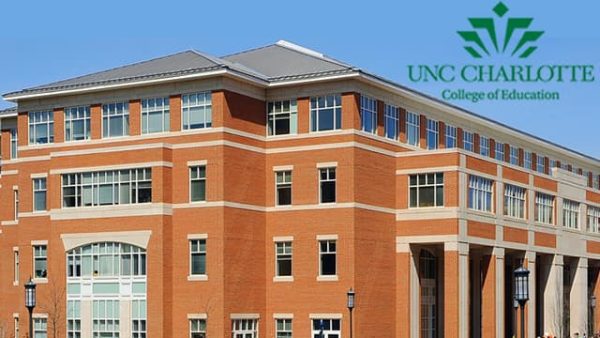Partnership helps Union County teachers earn graduate degrees

A new UNC Charlotte College of Education partnership under way in Union County is allowing a group of teachers to earn a master’s degree in education through a new model that brings that graduate classroom to them.
The pilot program offers 16 teachers in high priority middle and high schools the opportunity to earn a Master of Education at a significantly reduced rate, while collaborating with College of Education professors on site near their home schools.
The idea for the initiative was originated with leadership at the College of Education, Union County Public Schools (UCPS) and Advanced Learning Partnerships (ALP), and is funded by a generous gift from the Goodnight Foundation.
Ellen McIntyre, dean of the College of Education, said the closely tailored instruction sets this initiative apart.
“The program is focused on meeting the educational requirements of teachers in challenging environments. We shaped the curriculum based on the needs of this particular group of teachers at this time in the place they are teaching, with all of their strengths and obstacles.”
The yearlong, 33-credit program takes advantage of the convenience of online educational technologies, critical for working teachers, while ensuring students have regular access to face-to-face instruction. Portions of the program will be offered on site at Monroe High School and online via UNC Charlotte’s Moodle and Saba Classroom platforms. Teachers will be encouraged to immerse themselves in deep study and collaborative discourse, meeting with their UNC Charlotte embedded coaches frequently.
“Because the program is close to the work of the teachers, both in concept and setting, there is a higher chance that the collaborative bonds within the cohort will lead teachers to complete the program individually and as a team,” said John Jones, assistant superintendent for instructional programs at Union County Public Schools. “The coursework translates into real-world practice, and the partnership between the University and school system better ensures a support model that addresses work issues and generates practical ideas within the participants’ career settings.”
ALP, a nationwide educational consulting firm, will help graduate students apply concepts from their graduate coursework to decisions they make in the classroom. ALP President Amos Fudchuk said the program, which could technically be described as “distance learning,” in reality turns that idea on its head.
“The way I see it, we are actually much closer to application of pedagogy by anchoring Union County’s host schools as teacher residencies. Paradoxically, teachers in this innovative UNC Charlotte degree are much closer to their learning than they might be in a conventional graduate program.”
Jeanneine Jones, who co-directs the M.Ed program in middle and secondary grades education, said the Union County collaborative is an excellent opportunity for teachers with a few years of experience to take the next step.
“This allows an educator to transition from a novice teacher to one who is ready for the challenges of graduate school and the mastery of student behaviors, instruction, curriculum and content that it encompasses.”
The curriculum for the new degree program is based on the instructional foundation laid out by Jones and co-director Tina Heafner.
Like many school systems across the state, Union County has been grappling with ways to recruit and retain qualified teachers. This reality encouraged leadership to think creatively about retention incentives, and helped bring about the new partnership. Jones, the UCPS assistant superintendent, lauded the way the program has come together.
“The school system has been thrilled with the open reception and extra efforts UNC Charlotte has invested within the program efforts. They truly have supported a model for success and work collaboratively with the school system and teachers in aiming for successful completion of the innovative graduate courses.”
Dean McIntyre added that ultimately, she hopes the program will enrich the day-to-day professional lives of those whom it touches.
“The more a teacher learns the craft of teaching, the easier and more rewarding the job becomes. They will see more achievement in their students, which will in turn, make the job more inspiring and rewarding.”